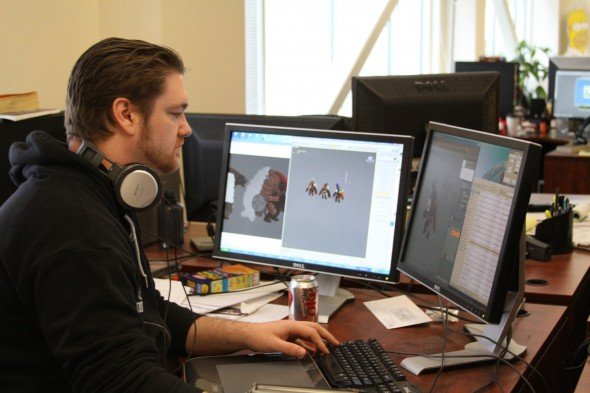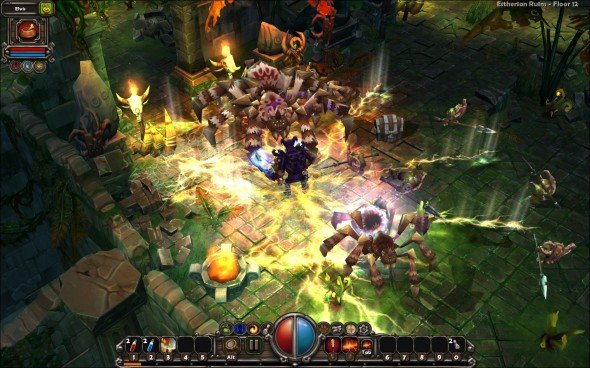It's an ethos Runic are applying to their future developments – principle among which is a massively multiplayer Torchlight game. In keeping with its affordable, accessible forebear, the as-yet-untitled MMO is intended for release as free-to-play, supported by microtransactions.
“The general vision is to have an MMO that plays as much like the singleplayer as we can get it,” Baldree says. “It'll have the same focus on relatively fast action: carving your way through hordes of monsters with a large number of hugely devastating skills. The MMO will obviously be different in that there'll be large static shared spaces that will not be randomised. That's one of the things we learnt from Mythos: you lose a sense of community and place if everything is randomised. So we decided to do a mix of the two.”
Maintaining the tactile feel and relentless pace of combat will also be challenging when player numbers increase, and Runic have been busy experimenting, using their own Torchlight multiplayer hack.
“The game has to be solo-able,” says Baldree, “but players still have to have skills that make them useful in a party and encourage them to work together. It's a bit of a balancing act.”
There are other challenges too: defining longer term goals, cultivating trade skills and commerce, building guild systems and PvP support, overhauling the character classes and introducing extensive character customisation.

Runic have also been keeping a close eye on Torchlight's inventive modding community. “It's been useful to look at what people think are the most important things to change in the game,” says Baldree. “The class mod stuff is the most fun, seeing people take the skills apart and put them back in new ways. Somebody made this steampunk robot class mod that fires missiles and had a machinegun. A lot of people also don't like item identification. If we keep it we are going to make it less onerous. Some of the things we're talking about are making identification automatic for items that are lower than your level. Or a passive lore skill that could automatically identify stuff for you within a certain range of levels.”
One of the biggest questions that remains is how Runic will make money out of their MMO. While the exact breakdown of purchasable items is still nebulous, the team have taken a principled stance. “I will never, ever buy a microtransaction item,” says Baldree. “I am that kind of player. And the game has to be enjoyable for me too. We don't want our monetisation stuff to offer ways to skip the game because the game is boring. We don't want it to feel like an enormous grind, or that you want to get past a bit because it sucks. It should be fun to play and you should want to do it; what you should be paying for is variance – additions that make it more enjoyable. Mounts are a great example. Everybody should be able to get mounts but you should be able to buy super special mounts that look cool or travel a slight bit faster or give you a secondary benefit.”
Keep up to date with the most important stories and the best deals, as picked by the PC Gamer team.
Runic have some other interesting ideas: leftovers from Mythos's proposed 'cartography' scheme, whereby a player could pay a tiny amount to have a random dungeon rolled especially for them.
“You could control how many bosses you might fight or the number of champions that spawn, or the luck factor in the dungeon,” says Baldree. “So if you were in a party situation and you just wanted something quick to do together you could buy an item that'd allow you to do that.”

“We don't want to sell anyone the most powerful sword,” says Erich Schaefer. “Maybe you can spend more money to increase your chances to getting these things, or speed up your levelling by a reasonable factor. Although it may be that the successful guilds need to spend a little more money, but we'll look into that.”
“We talk a lot about guild houses and outfitting them with trainers and quest givers and stashes,” explains Baldree. “But mostly we want the game to be fun.”
“I think our overall business philosophy is that we just want to have the widest base possible,” says Erich. “We want as many free players as possible. We'll worry about converting a few into payers as a secondary thought.”
With the accessible, cheap Torchlight filling the gulf between Diablos, Runic have certainly generated goodwill and an eager audience for an MMO sequel.
There's no doubt that the company feel their current fortunes have been hard won. But if the lessons from Flagship were painful, they've ultimately made for a better game.
“It's all water under the bridge,” says Baldree of the traumatic last days of Flagship. And given the success of Torchlight and bright prospects for its MMO incarnation, it's not hard to see the silver lining. “In the end, we had a really extended prototyping period on an action-RPG MMO and we got a really great team out of it. It was a net win.”
Martin Davies
PC Gamer is the global authority on PC games—starting in 1993 with the magazine, and then in 2010 with this website you're currently reading. We have writers across the US, Canada, UK and Australia, who you can read about here.


